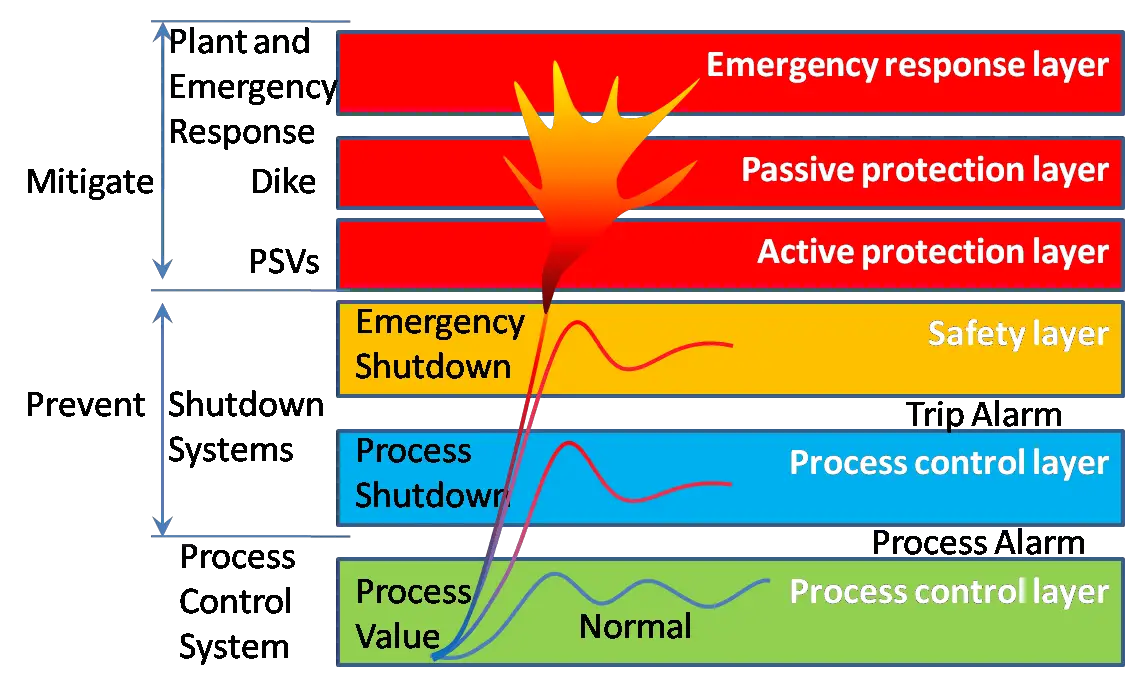Process shutdown (PSD) is defined as the automatic isolation and the activation of all part of a process. During a PSD the process remain pressurized.
Basically PSD consist of field mounted sensors. Valves and trip relays, a system logic unit for processing of incoming signals, alarm and MHI units. The system is able to process all input signals and activating output in accordance with the applicable cause and effect matrix chart
1. Shutdown the whole process
2. Shutdown part of the process
3. Depressurize/Blow down parts of the process
The Emergency Shutdown (ESD) shall minimize the consequences of emergency situations, related to typically uncontrolled flooding, escape of hydrocarbons, or outbreak of fire in hydrocarbon carrying areas or areas which may otherwise be hazardous. Traditionally risk analyses have concluded that the ESD system is in need of a high Safety Integrity Level, typically SIL 2 or 3.
Basically the system consists of field-mounted sensors, valves and trip relays, system logic for processing of incoming signals, alarm and HMI units. The system is able to process input signals and activating outputs in accordance with the Cause & Effect charts defined for the installation.

ESD can be automatically initiated by load shedding functions or manually by the operator through push button on the panel. ESD will shutdown and isolate all designated process related equipment, including inlet and outlet ESD valves. Depends on each project some plant will allow the power generation, utilities and fuel gas system keep running during this condition.
Process shutdown (PSD) system is a part of plant (facility) safeguarding system with a purpose to minimize the frequency and consequences of excursions outside the facility operating envelope.
Emergency shutdown (ESD) system is a part of plant (facility) safeguarding system with a purpose to keep the process within the design envelope and to prevent the escalation of abnormal conditions into a major hazardous event.
PSD and ESD can be considered as effects, which are triggered by certain causes, the PSD and ESD are levels of shutdown which discriminate between the seriousness of the causes leading to the appropriate effects.
Learn an example PLC program to control a pump based on level sensors using ladder…
In the PLC timer application for security camera recording, when motion is detected then camera…
In this example, we will learn batch mixing with PLC ladder logic program using timer…
This PLC example on manufacturing line assembly is an intermediate-level PLC program prepared for the…
In this article, you will learn the PLC programming example with pushbutton and motor control…
This article teaches how to convert Boolean logic to PLC programming ladder logic with the…
View Comments
Process shut down could be attributed to any planned shut down of the unit. It is an anticipated one and planned to attend the process issues during the favorable situation such as unit feed limited due to downstream unit issues, feed quality affects the unit throughput etc. Otherwise shut down time to be planned according to the severity of the issue.
Whereas emergency shutdown, as the terminology explains it is a forced situation on the process unit. One has to act according to the situation. Using the available resources, plan to go for safe shutdown of the unit as per the SOP of the unit.
Application of mind relating to the situation is the most important aspect as emergencies are always different and may be the type of emergency occurs also new. A very good knowledge about the process, plant and facilities available in the unit are the must to handle ESD safely.
As the name suggest, the process shutdown originates from the unwanted process conditions and emergency shutdown originates from emergency related issues.
Process shutdown will be initiated if the control system capture any process abnormalities as defined in the control system design. This system will try to stop propagating the impacts of process abnormalities downstream.
Emergency shutdown will be mostly initiated originating from abnormalities leading to serious safety concerns such as Runaway reactions leading to excessive temperature.
Nice Articles here thanks so much but can you make it printable please
Could anyone provide me with the regulation standard about ESD?
Thank you and Please share an article about relay based type of ESD?